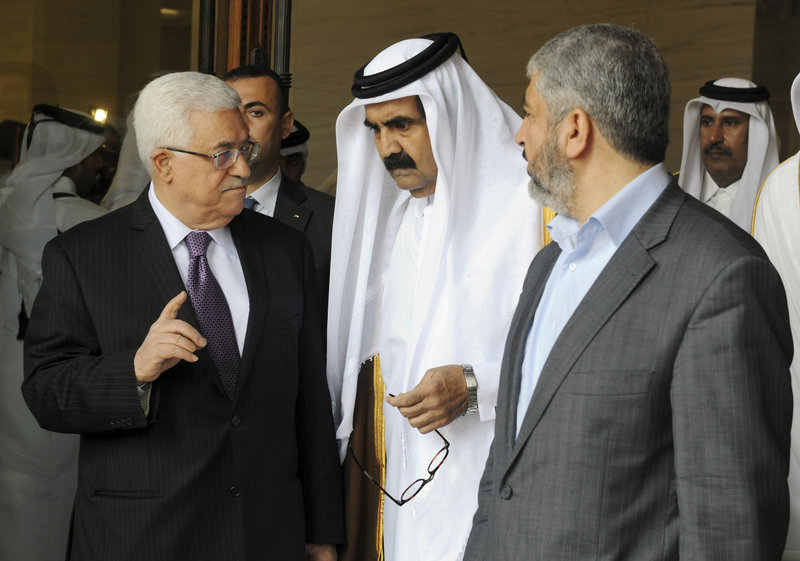RAMALLAH, West Bank — After months of wavering, Palestinian President Mahmoud Abbas took a decisive step Monday toward reconciliation with the Islamic militant group Hamas, a move Israel promptly warned would close the door to any future peace talks.
In a deal brokered by Qatar, Abbas will head an interim unity government to prepare for general elections in the Palestinian territories in the coming months. The agreement appeared to bring reconciliation – key to any statehood ambitions – within reach for the first time since the two sides set up rival Palestinian governments in the West Bank and Gaza in 2007.
Monday’s deal, signed in the Qatari capital of Doha by Abbas and Hamas chief Khaled Mashaal, put an end to recent efforts by the international community to revive long-stalled negotiations between Israel and the Palestinians on the terms of Palestinian statehood.
Abbas appears to have concluded that he has a better chance of repairing relations with Hamas, shunned by the West as a terror group, than reaching an agreement with Israel’s hardline prime minister, Benjamin Netanyahu.
Netanyahu quickly condemned the Doha deal. “It’s either peace with Hamas or peace with Israel. You can’t have them both,” he said.
In moving closer to Hamas, Abbas risks losing some of that backing and hundreds of millions of dollars a year in aid. Qatar, awash with cash from vast oil and gas reserves, assured the Palestinians that it would help limit any political and financial damages, according to Palestinian officials close to the talks.
Whether the Palestinian Authority loses any of the roughly $1 billion in foreign aid it received each year may partly depend on the interim government’s political platform and Hamas’ willingness to stay in the background.
The new government is to be made up of politically independent experts, according to the Doha agreement. If headed by Abbas, devoid of Hamas members and run according to his political principles, it could try to make a case to be accepted by the West.
The Quartet of international Mideast mediators – the U.S., the U.N., the European Union and Russia – has said it would deal with any Palestinian government that renounces violence, recognizes Israel and supports a negotiated peace deal. Abbas has embraced these principles, while Hamas rejects them.
Copy the Story Link
Send questions/comments to the editors.



Success. Please wait for the page to reload. If the page does not reload within 5 seconds, please refresh the page.
Enter your email and password to access comments.
Hi, to comment on stories you must . This profile is in addition to your subscription and website login.
Already have a commenting profile? .
Invalid username/password.
Please check your email to confirm and complete your registration.
Only subscribers are eligible to post comments. Please subscribe or login first for digital access. Here’s why.
Use the form below to reset your password. When you've submitted your account email, we will send an email with a reset code.